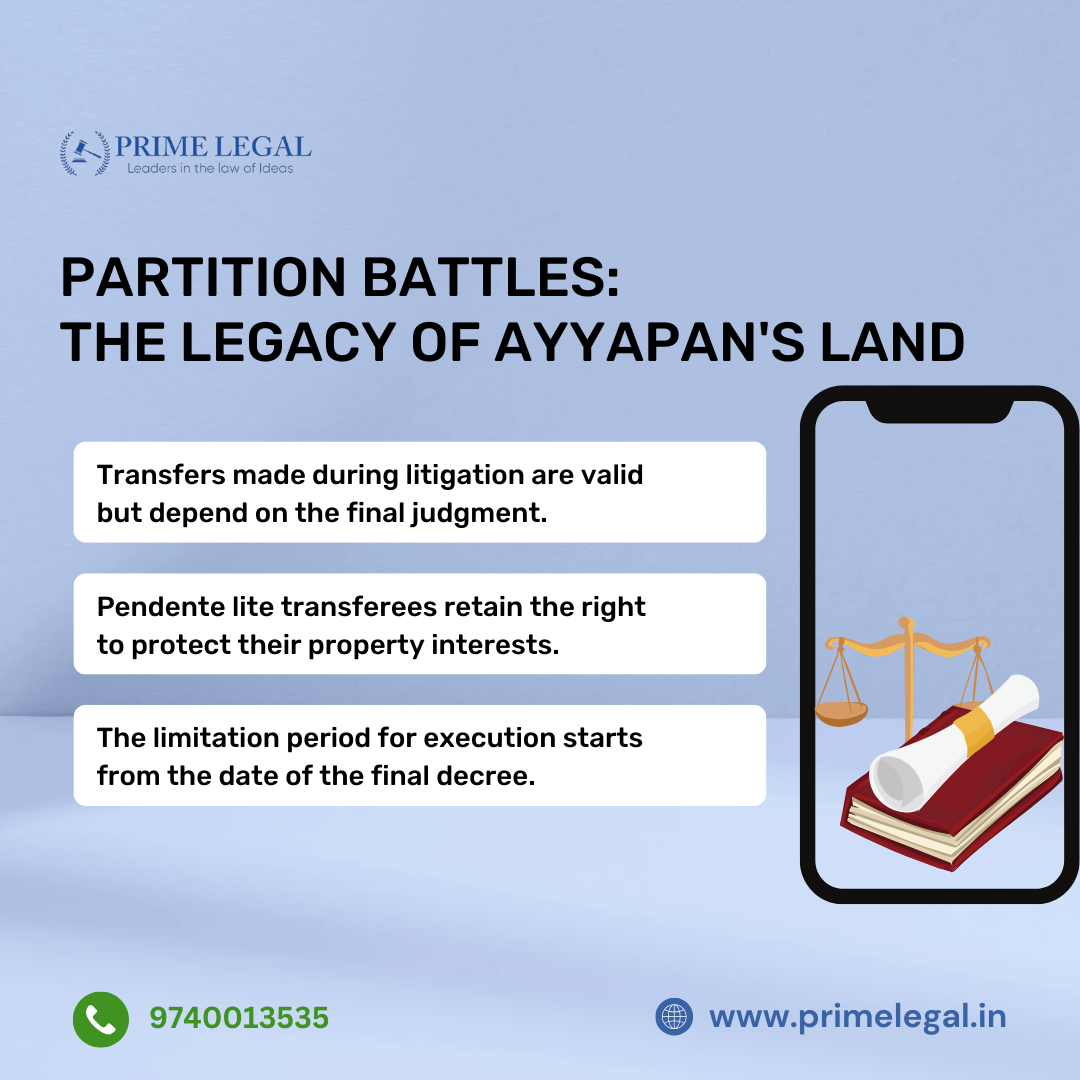CASE NAME : RENJITH K.G. & OTHERS VS SHEEBA
CASE NO. : 8315 – 8316 OF 2014
DATED : : OCTOBER 14, 2024.
QUORUM : R.MAHADEVAN, J.
FACTS OF THE CASE
The dispute in this case is about a suit of partition and possession of an immovable property which was first filed by Padmakshy who was the original plaintiff in the year 1956 for her share in 13 items in the immovable property for which a final decree was passed by the court in 1970. There is a specific property that is 1 acre and 67 cents which is the main contention. This property had belonged to Ayyapan initially and he had 8 children and the property was mortgaged in 1990s. Six of Ayyapan’s children transferred their shares after his death through a gift deed to Raghuthaman in 1963 and the rest of the shares were given to Padmanabhan. Without the consent of Padmashy, Padmanabhan had executed even more mortgages and after many such transfers, Raghunathan sought rights to those properties in 1964. In 1991 the final decree was sought by Padmakshy but Raghunathan had contested it. The High Court later remanded this case and sought to take it up for fresh consideration which has brought it to the current dispute.
ISSUES OF THE CASE
- Despite being a pendente lite transferee can Raghuthaman have independent rights over the property?
- Is the execution petition of Padmakshy limited by the Limitation Act?
LEGAL PROVISIONS
Order 21 Rule 97 of CPC- a decree holder can make an application if there is any resistance for the execution of the decree.
Order 21 Rule 99 CPC: a person can apply to restore their possession if they have been removed from their possession of the property.
Order 21 Rule 101 CPC: the titles or interests in regards to a property during a dispute is addressed here.
Section 52 of the Transfer of Property Act: the doctrine of lis pendens comes to action here where the transfer of property during the pendency of a suit will be based on the result of that suit.
Limitation Act, 1963: in an execution decree the time period for limitation will be from the date of the final decree and not from when stamped.
CONTENTIONS BY THE PETITIONER
The petitioner argued that Raghuthaman was a mere pendente lite and had no standing to contest the decree as he did not have any interest in regards to this matter and the court must surely not entertain this contesting. They also argued that he did not have any standing to get a re delivery of the property and that the petition of Padmakshy was within the limitation period.
CONTENTIONS BY THE RESPONDENT
They held that with the assignment deed Raghuthaman had established his rights and interests as well as the title to this property and therefore must be allowed to contest the decree. They also said that the High court’s decision to remand was proper so that a fresh look can be taken on the matter and there must be re delivery of property to Raghuthaman.
JUDGMENT
The court held that even a pendente lite transferee has the right to protect his interests to the property and that the appellants cannot invoke Rule 99 properly because they are not the decree holders. The court again emphasized that the limitation begins from when the decree is issued and not from the engrossing of it on a stamp paper.
ANALYSIS
Here in this case there is a clear understanding of the doctrine of lis pendens and that all transfers made during an ongoing litigation is not automatically nullified even though it is subject to the outcome of the case. The case is about the transfer of property and the partition suits. The case also highlights that the rights of a pendente lite and it does not automatically devoid him of all his rights to the possession of the property
CONCLUSION
The court says that the rights related to a property must be based on the merits and not be looked into the procedures as that is the right way in regards to dispute in property matters and especially in partition suits.
“PRIME LEGAL is a full-service law firm that has won a National Award and has more than 20 years of experience in an array of sectors and practice areas. Prime legal falls into the category of best law firm, best lawyer, best family lawyer, best divorce lawyer, best divorce law firm, best criminal lawyer, best criminal law firm, best consumer lawyer, best civil lawyer.”
WRITTEN BY: ADINA EVANGELINE G


